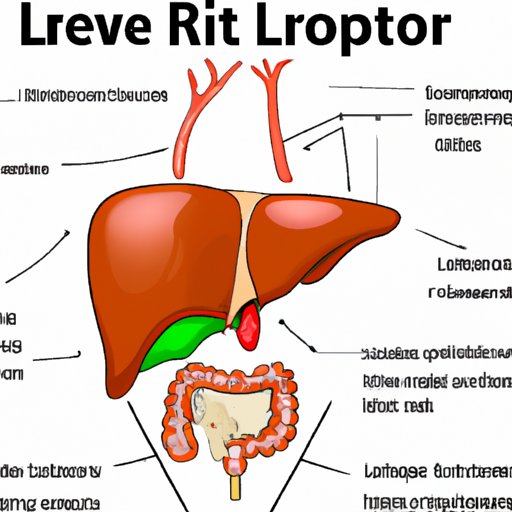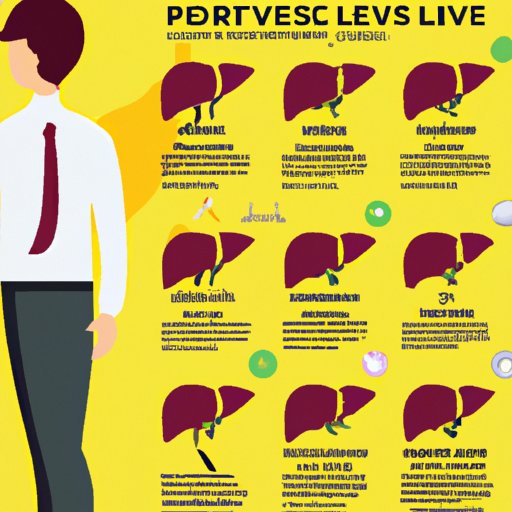Introduction
Your liver is a vital organ responsible for many essential functions in the body, including detoxification and digestion. It’s also responsible for producing bile, which helps break down food and absorb nutrients. Without a healthy liver, these processes can be disrupted, leading to various health complications. That’s why it’s important to understand how to maintain a healthy liver and recognize the signs of an unhealthy one.
Definition of Liver Health
A healthy liver is one that is able to perform its essential functions without any major problems. This includes filtering toxins from your blood, storing vitamins and minerals, and producing proteins and bile. An unhealthy liver, on the other hand, is one that is unable to do these things efficiently or at all. This can lead to a variety of symptoms and complications, such as jaundice and fatigue.

Overview of Symptoms and Causes
The most common signs and symptoms of an unhealthy liver include jaundice (yellowing of the skin or eyes), dark urine, abdominal pain or swelling, fatigue, loss of appetite, and nausea. These may be caused by a wide range of conditions, including fatty liver disease, cirrhosis, hepatitis, alcohol abuse, and certain medications or toxins. In some cases, the cause of an unhealthy liver may not be known.
Symptoms of an Unhealthy Liver and How to Improve Your Liver Health
If you experience any of the above symptoms, it’s important to get checked out by a doctor. They will be able to determine the cause of your symptoms and provide treatment options. Treatment may include lifestyle changes, such as reducing alcohol consumption, quitting smoking, and eating a healthy diet. In some cases, medication or surgery may be required.
In addition to seeking medical advice, there are several steps you can take to improve your liver health. These include eating a balanced diet rich in fruits and vegetables, exercising regularly, avoiding processed foods, limiting alcohol consumption, and managing stress. You should also avoid taking any medications without consulting your doctor first.
Causes of Liver Disease and Tips for Prevention
Liver disease can be caused by a variety of factors, including excessive alcohol consumption, obesity, viral infections, and certain medications. Other risk factors include having a family history of liver disease, being over the age of 40, and having diabetes or high cholesterol. To reduce your risk of developing liver disease, it’s important to follow a healthy lifestyle, maintain a healthy weight, and limit alcohol consumption.

Understanding the Role of the Liver in the Body
The liver is an essential organ in the body, performing many important functions. It helps filter toxins from the blood, metabolize proteins, produce bile, store vitamins and minerals, and break down fat. A healthy liver is necessary for proper digestion and absorption of nutrients, and for maintaining overall health and wellbeing.

Diet and Lifestyle Changes to Promote a Healthy Liver
Eating a healthy, balanced diet is essential for maintaining a healthy liver. Foods that are beneficial for the liver include leafy greens, nuts, seeds, and whole grains. You should also limit your intake of processed foods, added sugars, and saturated fats. Additionally, regular exercise and stress management can help keep your liver healthy.
The Benefits of Regular Liver Check-Ups
Regular check-ups are important for keeping your liver healthy, as they can detect any problems early on. Common tests used to assess liver health include blood tests, imaging scans, and biopsies. If any abnormalities are found, your doctor will work with you to develop a treatment plan.
Conclusion
Maintaining a healthy liver is essential for optimal health and wellbeing. Understanding the signs and symptoms of an unhealthy liver, as well as the risk factors and causes, can help you take the necessary steps to improve your liver health. Eating a healthy diet, exercising regularly, and limiting alcohol consumption can all help to promote a healthy liver. Finally, it’s important to get regular check-ups to ensure your liver is functioning optimally.
(Note: Is this article not meeting your expectations? Do you have knowledge or insights to share? Unlock new opportunities and expand your reach by joining our authors team. Click Registration to join us and share your expertise with our readers.)
